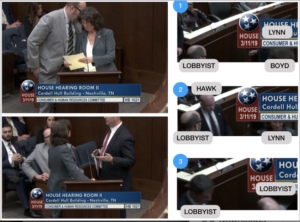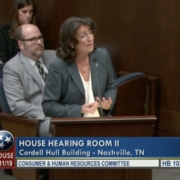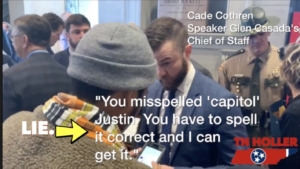Rep. Lynn Defends Extra Waste Because “Landfill-Mining” May Be A Thing One Day
Bill, written by corporate special interest group, aims to prohibit cities from regulating plastic containers
As local governments around the world are proposing rules to keep plastic out of rivers and lakes, Tennessee’s legislature is headed the opposite direction.
House Bill 1021, sponsored by Rep. Susan Lynn, R-Mount Juliet, District 57, would prohibit local governments from regulating single-use food containers, plastic grocery bags or eating tools, such as straws. The legislation appears to be copy-and-pasted from the website of corporate special interest group ALEC.
Lynn, who presented the legislation Monday, March 11 to the House Consumer and Human Resources Committee, consulted corporate lobbyists multiple times during her testimony. At one point, the committee chairman Rep. Clark Boyd, R-Lebanon, District 46, called a five-minute recess, during which he, Lynn, Rep. David Hawk, R-Greeneville, District 5, and the corporate lobbyists could be seen leaving the meeting together.

‘Alarming level of microplastics in the Tennessee River’
Though no local governments have enacted rules that would be affected by this preemption law, there is an excellent reason to enact regulations that reduce single-use plastic items: the Tennessee River is one of the most plastic-polluted rivers in the world.
A 2019 report, conducted by geology and hydrology professor Dr. Martin Knoll of the University of the South in Sewanee, said microplastic levels in the Tennessee River are among the highest ever measured.
The study concluded half — 48 percent — of the microplastic in the Tennessee River is polyethylene (plastic bags) and another 17 percent was polypropylene, a water-resistant plastic used widely in food packaging.
National Geographic, which also reported on the study, says freshwater rivers in the United States dump between 5 million and 14 million tons of mircoplastic into oceans each year.
“Scientists have found microplastics in 114 aquatic species, and more than half of those end up on our dinner plates… Enough research has been done now to show that the fish and shellfish we enjoy are suffering from the omnipresence of this plastic.”
Local control
Lynn’s bill to preempt local governments from enacting rules is part of a disturbing trend by the Republican majority to intrude on decisions best made by community leaders.
Rep. Bob Freeman, D-Nashville, District 56, said cities — especially large cities that have challenges distinctly different from small communities — need autonomy to confront those issues.
“In Nashville, we have roughly 700,000 people. The amount of waste that’s produced by 700,000 people, as you can imagine, is fairly substantial,” Freeman said addressing the bill sponsor. “I struggle to understand why you would carry this bill that would essentially take away the ability from large cities that are dealing with this issue — any ability they would have to regulate issues that they see first hand… you have no issue with taking away a local government’s ability to regulate and manage themselves?”
Rep. Lynn responded, “I have no issue with taking this away from a local government. Are they next going to ban—I don’t know—your cereal box?”
Clean water concerns voiced
Rep. Dwayne Thompson, D-Cordova, District 96, challenged the bill sponsor on why she would want to block a local government seeking rules that protect Tennessee’s lakes and rivers.
“I’m committed, like Rep. Freeman, to a great business climate here, but I’m also committed to a clean and healthy environment for our families here to live in,” Thompson said.
At one point, Rep. Lynn appeared to argue in favor of the bill, which will protect plastic solid waste, by suggesting that “someday our landfills will be mined for items that might be of some value.”
Procedural snag
The House Consumer and Human Resources Committee will hear the bill again March 18.
During the meeting on March 11, Rep. Hawk voiced support for the bill, but protested the procedure because Rep. Lynn did not present an amendment to the bill being considered by the Senate.
Part of the reason for the late amendment from the Senate was that the bill was initially filed as a caption bill to change the deadline for counties to provide updated maps to the legislature. (Note: A caption bill is a legislative placeholder that sometimes has nothing to do with its initial stated purpose.) As of this writing, the legislature’s website has still not updated the bill with Lynn’s amendment, which re-writes the entire bill miles away from its starting position.
After the recess called by chairman Boyd, Rep. Lynn agreed to delay a vote until next week.
How they’ve voted so far:
House Consumer Subcommittee passed the bill on a Voice Vote, Ayes Prevailing:
Rep. Mike Sparks, R-Smyrna, District 49
Rep. Clark Boyd, R-Lebanon, District 46
Rep. Mark Cochran, R-Englewood, District 23
Rep. David Hawk, R-Greeneville, District 5
Rep. Lowell Russell, R-Vonore, District 21
Rep. Barbara Cooper, D-Memphis, District 86



